SJF<Life & Work Balance> #8
From Outfit to Infit:
How to Adjust and Accelerate in the Post-Corona World
아웃핏에서 인핏으로: 포스트 코로나 시대에 적응하고 발전하는 법
Kate Park
(Founder of Leading Edge, business coach and trainer based in Munich, Germany)
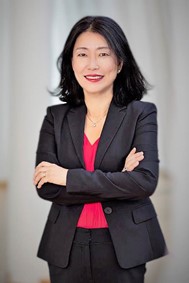
Kate is a business coach and trainer, and has advised numerous global and Korean companies such as Deutsche Bank, ABB, Lufthansa, Siemens, Samsung Electronics and Hyundai Motors Europe in the area of leadership, communication and change management. Currently she is a strategic partner of HME (Hyundai Motors Europe) while at the same time advising Korean talents to build a career in Europe. She lives in Munich, Germany, with her husband and four children.
케이트는 비즈니스 코치 겸 트레이너로, 도이치뱅크, ABB, 루프트한자, 지멘스, 삼성전자, 현대자동차 유럽 등 수많은 글로벌 및 한국 기업들에게 리더쉽, 커뮤니케이션, 변화관리 분야에 대해 자문을 해왔다. 현재 그녀는 HME(현대자동차 유럽)의 전략적 파트너인 동시에 한국 인재들의 유럽에서의 경력개발에 도움을 주고 있으며, 뮌헨에서 남편과 네 명의 아이들과 함께 살고 있다.

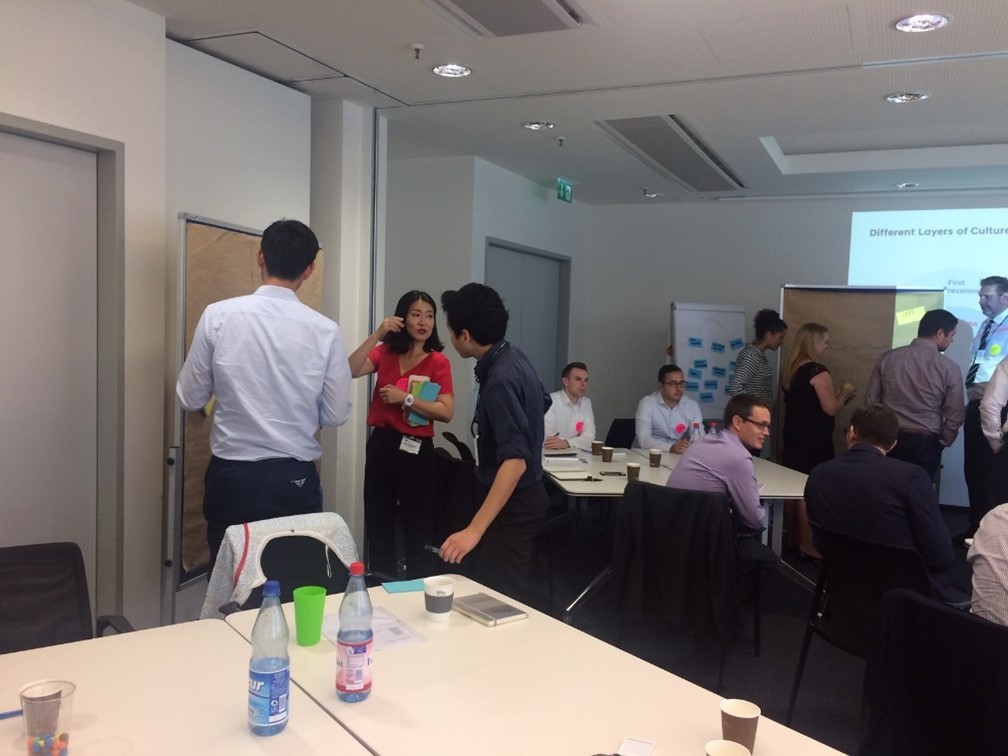
(Left) Global Internship Workshop with Sungjoo Foundation, 2019 / (Right) Workshop in Germany
The future is not what we thought it would be only a few months ago. Over the six months, COVID-19 has dramatically changed virtually all expectations for 2020 and the immediate future. Beyond the loss of life and the fear caused by the pandemic, businesses around the world have faced disruptions at a speed and scale without precedent in the modern era. Many individuals and organizations are shocked and threatened by this novel crisis caused by COVID-19. However, during the crisis, some countries, companies and individuals are coping better than others, at times doing even better than before. What made the difference? What did they do better than others? What did they stop, start and accelerate in coping with the crisis? As we step into the post-corona future, we need to find a balance between what didn’t work before (what to stop) and what needs to happen (what to start) and what we need to accelerate in order to succeed in the next normal.
앞으로 다가올 미래는 불과 몇 달 전 우리가 생각했던 미래의 모습과 크게 다르다. 지난 6개월 동안 일어난 COVID-19의 대유행은 가까운 미래에 대한 사람들의 기대를 완전히 바꾸어 놓았다. 팬데믹으로 야기된 인명 손실과 공포를 넘어, 그 속도와 규모의 측면에서 전 세계 기업들은 전례 없는 혼란을 겪고 있으며, 개인과 단체 역시 COVID-19로 인한 새로운 위기에 충격과 위협을 느끼고 있다. 하지만, 이러한 전세계적인 어려움 가운데에서도 특정한 국가, 기업, 개인들은 위기상황에 잘 대응하고 있으며, 때로는 이전 보다 더 나은 모습을 보이기도 한다. 그렇다면 위기에 대응하는 이들 간의 차이점은 무엇인가? 그들은 위기 대처에 있어 다른 이들보다 어떤 나은점이 있으며, 위기 대응을 위해 무엇을 멈추고, 시작하고, 가속화했는가? 코로나 이후의 미래사회에 성공적으로 진입하기 위해서는 없어져야 할 것, 새로 시작해야 할 것, 그리고 가속화해야 할 것 사이에서 적절한 균형을 찾는 것이 중요하다.
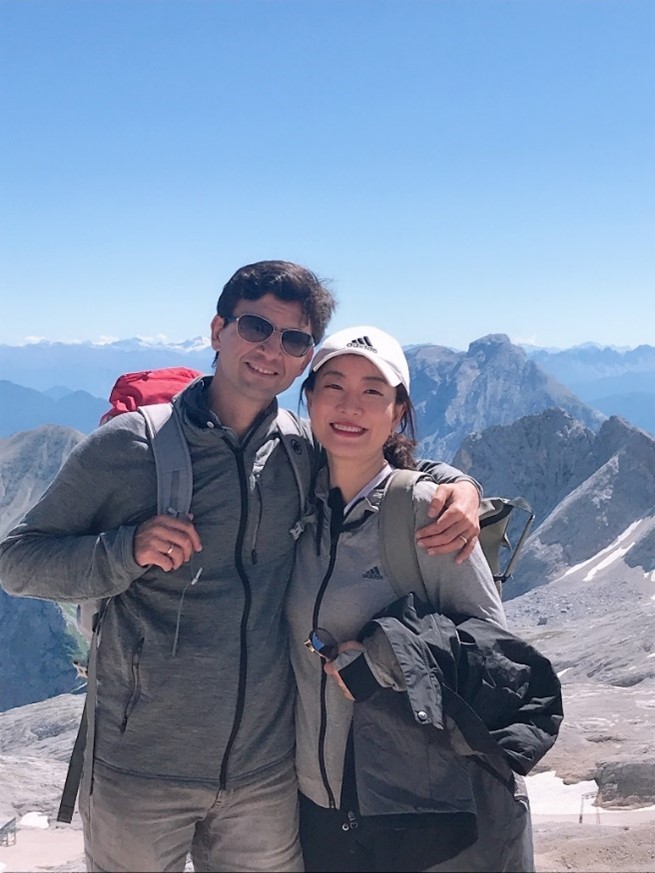
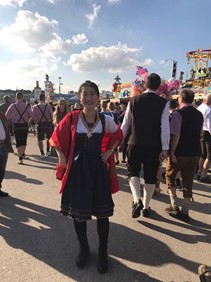
With my husband Oktoberfest, Munchen
Crisis: Danger or Opportunity? / 위기: 위험인가 기회인가?
Before going into details about the balance between what worked before and what needs to happen, let’s talk about the word “crisis”. The term itself can offer us interesting perspectives.
In Korean, crisis is 위기(YuiGi), as we all know the first syllable, 위Yui means a “danger” but the second syllable 기Gi means an “opportunity”. The English word “crisis” stems from the Latinized form of the Greek word krisis, meaning "turning point in a disease", in other words, a critical moment or turning point at which things could get better or worse: it's a critical moment. The essence of the meaning is quite similar, leading us to ask questions such as: Why some people seek for opportunities while others are threatened by dangers? What made them different? What mindset and behaviors do we need in order to thrive in times of crises?
이전에 효과적이었던 것과 앞으로 새로이 요구되는 것 사이에서의 균형에 대해 설명하기 전에, “위기”라는 단어에 대해 이야기해 볼까 한다. “위기”는 용어 그 자체에 흥미로운 점이 있다. 우리말로 ‘위’는 위험하다는 뜻이지만 ‘기’는 기회라는 뜻이다. 또한 Crisis는 ‘Krisis'의 라틴어 형태에서 유래되었는데, ‘질병의 터닝포인트'를 의미한다. 이 두 언어간 의미의 본질은 상당히 비슷하다. 왜 어떤 사람들은 위험을 두려워하는 반면 어떤 사람들은 오히려 기회라고 생각하는가? 그들의 차이점은 무엇인가? 위기 상황에서도 성장을 이루기 위해서는 어떤 사고방식과 행동이 필요한가?

My four children
Since I live in Munich, Germany, we have experienced lockdown for more than two months from March to May. During the lockdown time, jogging pants became my main everyday outfit, there was no need to wear makeup and buy business suits or nice dresses for going out… Literally, jogging pants became my “Infit” which I now wear every day at home. Indeed “infit” became much more important than “outfit”. One day when I going for an extended walk with my jogging outfit, a new definition of “infit” occurred in my mind. I do more sport now sport since there is no business trip or meetings to make my body more fit, but what can I do make my “mind” more fit? “Infit” doesn’t mean only the outfit which I wear at home, but also refers to the “fitness” of my mindset and attitude. My thought on “infit” became one of the main topics of the webinar which I’ve facilitated for all the leaders from Hyundai Motors Europe; Leadership in times of crisis, how to strengthen your leadership muscle?
나는 현재 뮌헨에 거주하고 있으며, 지난 3월부터 5월까지 두 달 이상 외부 활동이 금지된 락다운(lockdown)를 경험했다. 그 기간 동안 조깅 바지가 내 평상복이 되었을 만큼, 외출을 위한 화장, 비즈니스 정장 또는 좋은 드레스를 입을 필요가 없어졌다. 말 그대로, 조깅 바지는 집에서 매일 입는 나의 "인핏(infit)"이 되었다. 실제로 "인핏(infit)"는 “아웃핏(outfit;옷차림)"보다 더 중요 해졌다. 어느 날 조깅복을 입고 산책을 나갔을 때, 마음 속에 '인핏(infit)'의 새로운 정의가 떠올랐다. 평소에도 건강을 유지하기 위해 운동을 많이 하는 편이지만, 어떻게 하면 몸의 건강 뿐 아니라 내 '마음'의 건강도 챙길 수 있을까 하는 생각이 들었다. 'infit'는 내가 집에서 입는 옷만 의미하는 것이 아니라, 내 사고방식 즉 마음가짐과 태도가 지닌 '건강'을 가리키기도 한다. 이러한 나의 '인핏(infit)'에 대한 생각은 현대 자동차 유럽지사의 모든 리더들을 대상으로 진행해온 나의 웹세미나의 주요 주제 중 하나가 되었다: “위기의 리더십, 어떻게 그 역량을 강화시킬 것인가?”
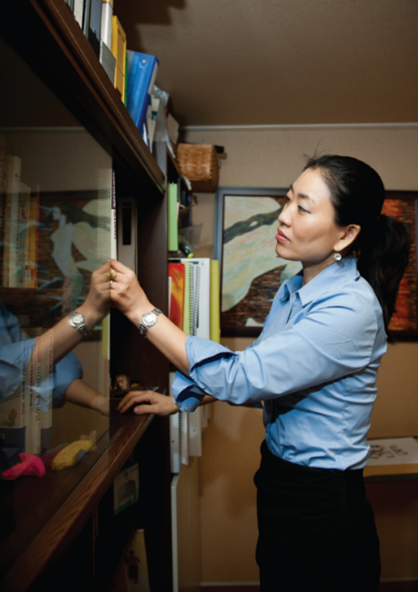

Working in my home Hyundai workshop video capture
How to strengthen your “Leadership muscle” in times of crisis?
The world post Corona cannot be the same as before and the return after the pandemic will be a gradual process rather than one determined by government publicizing a date and declaring “all over, open for the normal again.” For example, many leading global companies such as Microsoft or, Facebook have announced that “working from home” will be the new normal until at least 2021. In other words, we need to stop assuming that the old ways will simply return. Many Korean companies have also realized this and become more open to home office and flexible working hours. When working from home, there is no boss who watches and controls you while doing your job. There is not much space for hierarchy or control. Here you have to be more independent, disciplined and accountable. This is a major change from typical Korean corporate culture: Traditionally, if you are a junior, you just need to wait for the order from your boss and get it done without questioning, you don’t want to go home before your boss leaves at the office as a sign of respect and to show your commitment. Now, these old days are gone, being “polite and nice” is not what you need; instead, you need to step up and take initiative to get things done.
어떻게 위기속에서 '리더십 역량'을 강화할 것인가? 포스트 코로나 시대는 이전과 같을 수 없으며, 일상으로의 복귀는 "코로나 비상상황은 종식되었으니, 다시 모두 일상으로 돌아가라"는 정부의 선언으로 결정되는 것이 아닌, 점진적인 과정 속에서 이루어질 것이다. 마이크로소프트나 페이스북 같은 선도적인 글로벌 기업들이 "재택근무" 가 새로운 일상이 될 것이라고 발표했듯이, 코로나 종식 이후에도 그 이전의 방식이 그대로 되돌아온다고 가정할 수는 없는 것이다. 이러한 상황을 깨달은 많은 한국 기업들도 재택근무와 유연근무시간에 대해 열린 태도를 취하고 있다. 재택근무시에는 직접적으로 업무를 관리 감독할 상사가 없으므로, 우리는 스스로 책임감 있는 독립적인 사람으로 훈련 되어야한다. 이는 전형적인 한국 기업 문화가 갖는 가치와 거리가 있다. 일반적으로 지금까지는 상사에게 존경과 헌신을 보여주기 위해 상사의 퇴근시간을 기다려야 하는 예의바름과 공손한 태도가 기본이었다면, 앞으로는 일의 성과를 위해 스스로 주도권을 쥐는 것이 필요하게 되었다.
Beyond the realms of corporate culture, this change could mean a lot more: What if you stop focusing on external rewards such as money, recognition and power but start more focusing on your “purpose”, your “beliefs”. During the Corona time, many of us realized what is essential in our lives, i.e. Health, family and community. Going back to these basics may be a useful starting point to first ask “why” you are doing the things that you care about right now. In other words, try, find meanings, go trust your inner voice and convictions, listen, engage and communicate.
이러한 변화는 기업 문화의 영역에서 벗어나 훨씬 더 많은 것을 의미한다. 돈, 인지도, 권력 같은 외부적 보상에 신경 쓰기 보다 자신의 '목적'과 '신념'에 더 집중하면 어떨까. 코로나 시대를 겪으며 많은 사람들은 삶에서 무엇이 필수적이고 중요한지를 깨닫게 되었고, 바로 건강, 가족, 지역사회와 같은 기본적인 것에서 답을 얻었다. 우리가 돌아가야 할 곳은 바로 우리 삶의 기본이며, 이 기본을 통해 의미를 찾고 내면의 목소리에 확신을 갖고 외부와 소통하는 것이다.

Kimchi teamwork
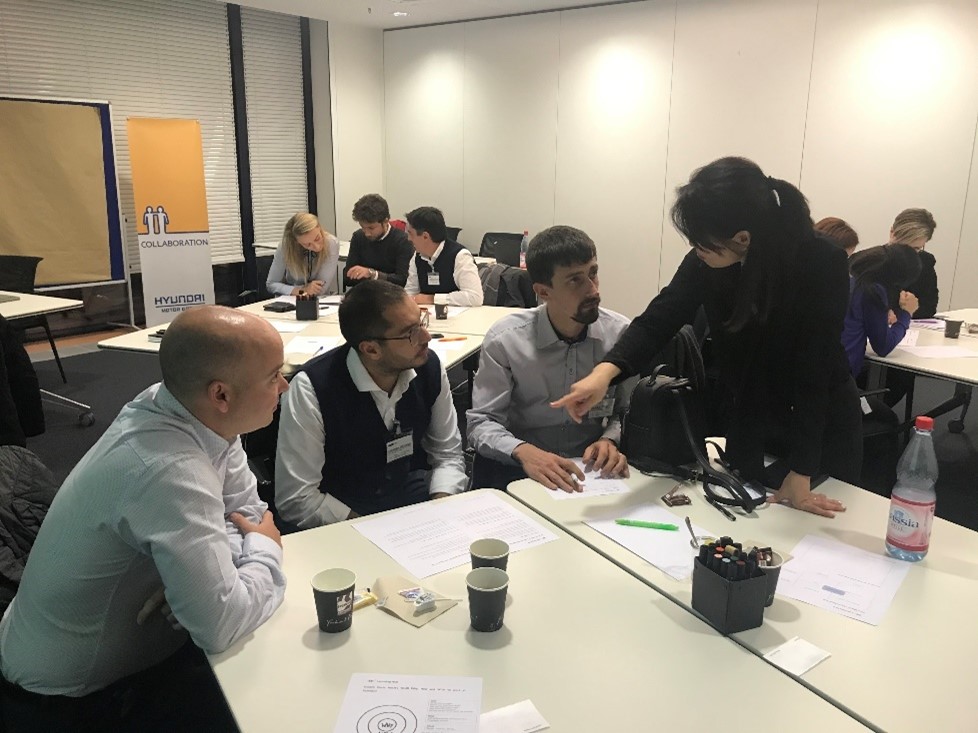
Seminar in Hyundai Motor Europe GmbH
What to Accelerate? Collaboration, flexibility, inclusion, and accountability
무엇을 개발해야 하는가? 협업, 유연성, 포용성 그리고 책임
Collaboration, flexibility, inclusion, and accountability are values that many leaders have been trying to promote for years, with some progress. But the massive change associated with the coronavirus could and should accelerate changes in mindset and behaviors that foster these values.
협업, 유연성, 포용성, 책임감과 같은 덕목들은 많은 리더들이 지난 수년간 추구해온 가치들이다.그러나 코로나 바이러스가 야기한 거대한 변화는 이러한 가치들을 조성하는 사고방식과 행동에 있어서의 변화를 촉진시켰다.
Collaboration: Since remote working has become the new normal, the possibilities to collaborate with other departments and teams have improved, and yet still many silos exist not only in the organizations but also in our mindsets. Meet more people with diverse backgrounds, listen and share different perspectives and work together to achieve your goals. If you are based in Korea and still insisting to use “Naver” for search, thinking inside out, not outside in, the opportunities to collaborate with others will be limited.
협업: 원격 근무가 새로운 표준으로 자리잡은 이후, 다른 부서 및 팀과의 협업 가능성은 향상되었지만, 여전히 많은 장벽들이 조직 뿐만 아니라 우리의 사고방식에도 존재한다. 다양한 배경을 가진 더 많은 사람들을 만나고, 서로 다른 관점을 듣고 공유하며, 목표를 달성하기 위해 함께 노력해야한다. 한국에 기반을 두고 있다고 해서 국내 검색엔진인 '네이버' 이용을 주장한다면, 다른 사람과 협업할 수 있는 기회는 제한될 것이다.
Flexibility: Question all the “prerequisites” which used to be considered “success” in life. Getting a diploma at a respected university and starting a career at a reputed company in Korea and being promoted earlier than others…. Ask yourself “why” you want that, ask yourself whether there are only these tracks to achieve success; you may have to challenge the very definition of success. Once you are clear about your purpose in life, then you need to be flexible to reach that goal. A key feature of crisis is uncertainty, if you are not flexible in your mindset and behaviors, the chances of dissatisfaction and frustration will become larger.
유연성: 인생에 있어 "성공"으로 인식되어온 모든 "전제조건"에 의문을 가져라. 저명한 대학의 졸업장을 받고, 유명한 회사에 다니며, 남들보다 일찍 승진하는 것. "왜" 그것을 원하는지, 그리고 성공을 위해 오직 이 길만이 존재하는지 스스로에게 물어보라. 이 질문에 대한 답에 이르기 전에, 우리는 성공에 대한 정의부터 다시 생각해야 할지 모른다. 일단 인생의 목적을 분명히 하고 나면, 그 목표에 도달하기 위한 유연함을 지녀야 한다. 위기의 특징은 불확실성으로, 마음가짐과 행동이 유연하지 못하면 불만족과 좌절감이 커지게 된다.
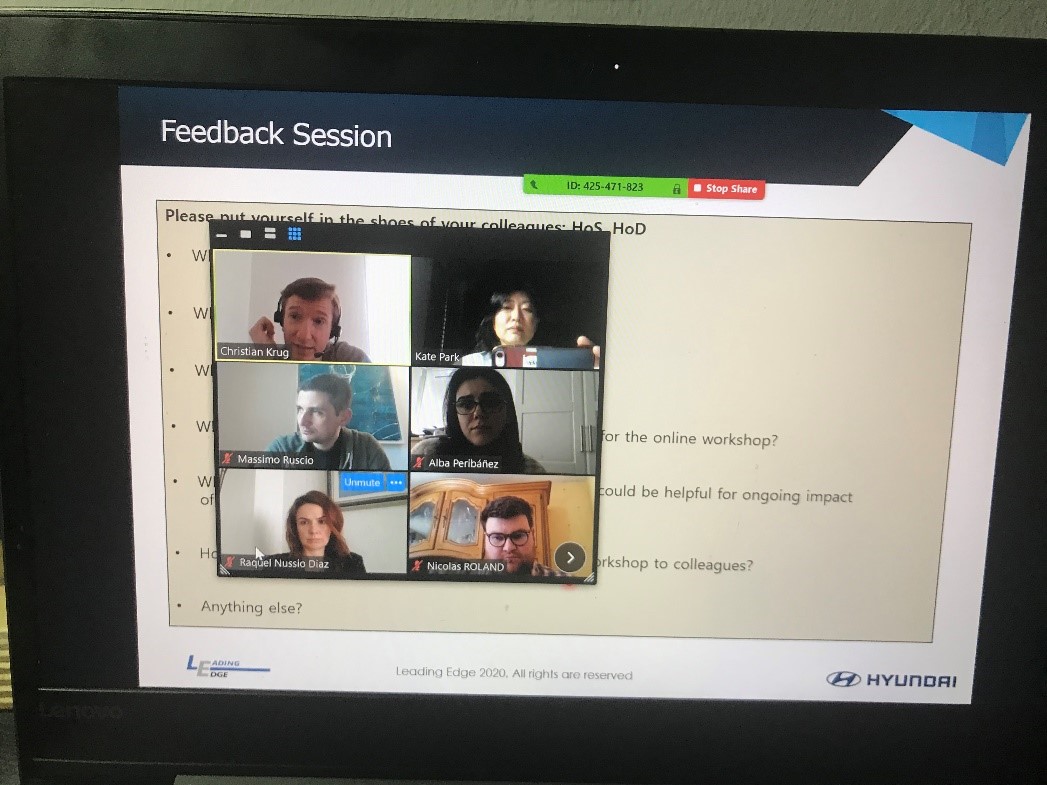
Hyundai Webinar
Inclusion: We have realized how connected we are in the world by experiencing pandemic. Although we live in a diverse world in terms of nationalities, ethnic groups, languages and cultures, we need to have a mindset of “inclusion”. To make diversity work, we need inclusion. Inclusion is not easy to learn and practice, especially for us Koreans since we have lived in a highly homogeneous society. Having worked with Korean managers and leaders from all over the Europe, inclusion is one of the most difficult value to be learned for Koreans. To practice and embrace inclusion, one of the best ways is to get out of Korea to work, at least for a certain period of time, so that you can broaden your perspectives and think of yourself more objectively. This will enable you to communicate more effectively with people from diverse backgrounds.
포용성: 팬데믹 경험을 통해 우리는 각자 서로가 얼마나 긴밀히 연결되어 있는지를 깨달았다. 국적, 민족, 언어, 문화 면에서 다양한 세계에 살고 있지만, 다름을 '포용'하는 사고방식을 갖추는 일은 반드시 필요하다. 즉, 다양성을 발현시키기 위해서는 포용력이 필요하다. 특히 온전한 단일 민족으로 살아온 우리 한국인들에게는 ‘포용력’을 배우고 실천하는 일이 쉽지 않을 것이다. 유럽 각지에서 온 한국인 매니저들과 함께 일해보면, 포용력은 한국인들에게 가장 배우기 어려운 가치 중 하나이다. 포용력을 체득하는 가장 좋은 방법 중 하나는 일정 기간 동안 한국을 벗어나 일하며 시야를 넓히고 보다 객관적으로 자신을 바라보는 것이다. 이것은 당신이 다양한 배경을 가진 사람들과 더 효과적으로 소통을 할 수 있게 해줄 것이다.
Accountable: Being accountable is not the same as being responsible, being accountable not only means being responsible for something but also ultimately being “liable or answerable” for your actions, it’s about true ownership. Although you are one of the team members, every decision you make and every action you do, you should think as if you were a CEO of company you are working at, so that you can value your actions more and estimate and evaluate the consequences more thoroughly.
책임감: 책임(accountable)을 지는 것은 책임감(responsible) 있는 것과는 다르다. 책임 지는 것은 어떤 것에 대한 책임감을 가질 뿐만 아니라, 그 행동에 대해 "답할 수 있는" 진정한 주인 의식(ownership)에 관한 것이다. 당신이 비록 팀원 중에 한 사람일 뿐이라도, 여러분이 내리는 모든 결정과 하는 행동은 마치 그 회사의 최고경영자 즉, CEO인 것처럼 생각해야만 여러분은 여러분의 행동을 더 가치 있게 생각하고 그 결과를 더 철저하게 예측하고 평가할 수 있을 것이다.
Businesses around the world have rapidly adapted to the pandemic. For those who think and hope things will basically go back to the way they were: stop. They won’t. It is better to accept the reality that the future isn’t what it used to be and start to think about how to make it work. It’s difficult to have hope and optimism when times are hard. To accelerate the road to not only recover but rebuild, we need to build our inner muscle both of purpose and of optimism and to expand our circle of influence to meet the challenges in uncertain future. Breaking out of old habits can be hard but we Koreans have proven to be the masters of crisis. Our “Korean Can Do” spirit will be the secret ingredient to help strengthening our inner muscle!
전 세계의 기업들은 급속도로 팬데믹에 적응하고 있다. 여전히 과거로 돌아가기만을 바라고 생각하고 사람들은 멈춰 있는 것이다. 세상은 결코 과거로 돌아가지 않을 것이다. 미래가 예전과 같지 않다는 현실을 받아들이고 어떻게 하면 일이 제대로 돌아갈 수 있을지 방법을 찾아야 할 것이다. 시대가 어려울수록 희망과 낙관을 찾기는 어렵지만, 회복 뿐 아니라 더 큰 도약을 위해서는 명확한 목적과 긍정의 힘을 모두 갖춘 내적 근육을 만들고, 불확실한 미래에 대한 도전을 위해 영향권을 넓혀야 한다. 몸에 배인 습관을 바꾸는 것은 쉽지 않지만, 우리 한국인들은 무엇보다 위기의 강한 민족임을 늘 증명해오고 있다는 것을 알아야 한다. '한국인은 할 수 있다' 라는 우리만의 저력은 내적인 힘을 키우는데 큰 도움이 될 것이다!
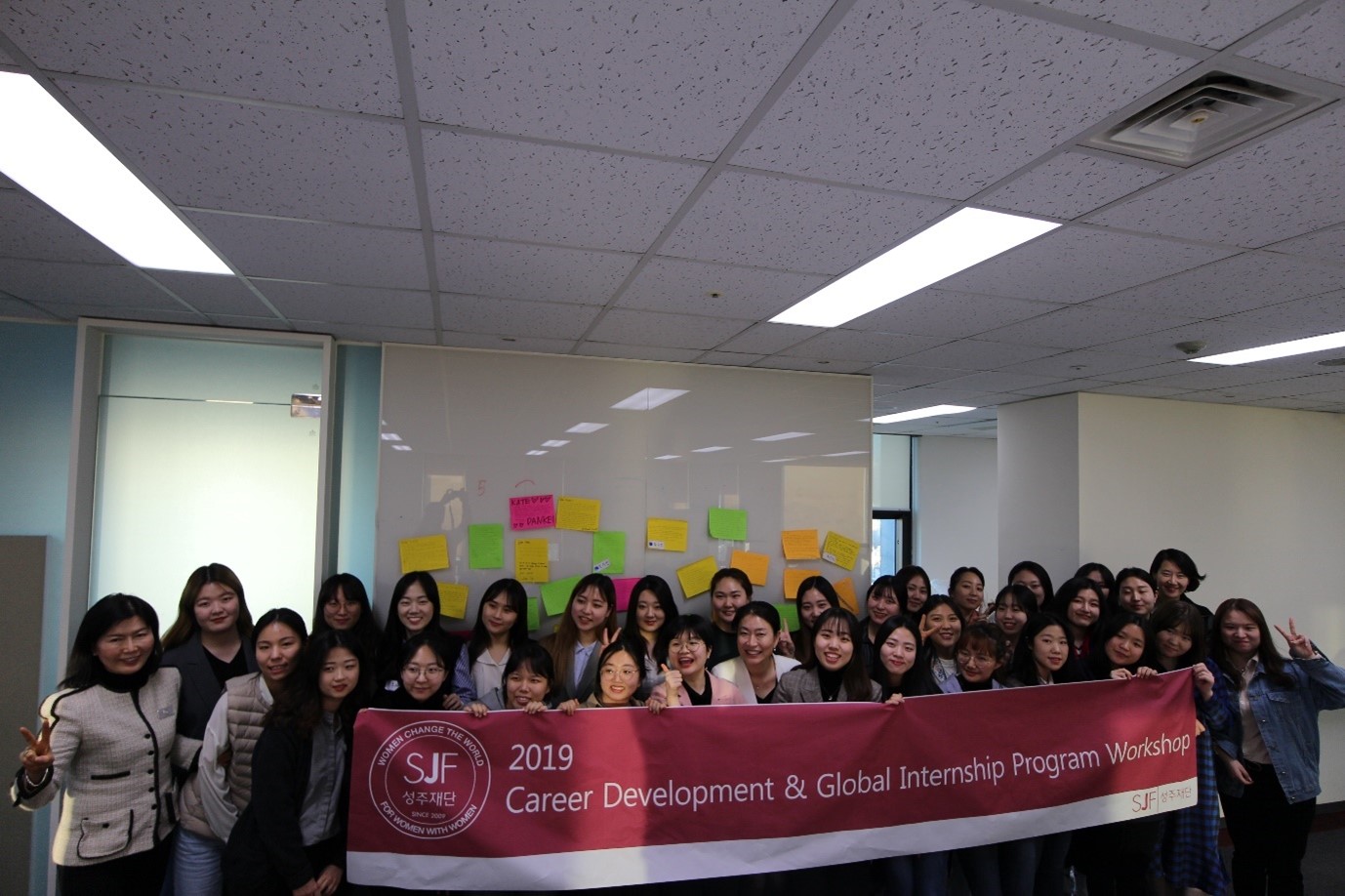
2019 Career Development & Global Internship Program Workshop in SungjooFoundation













